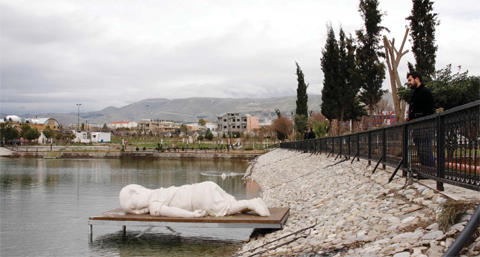 SULAIMANIYAH, Iraq: People look yesterday at a sculpture by artist Bakhtiar Halabjay depicting Aylan Kurdi, a three-year-old Syrian boy who drowned off Turkey, displayed on a pier at Azadi (Freedom) Park in this northern Iraqi Kurdish city. The sculpture replicates the photograph of tiny Aylan’s lifeless body on the beach at Bodrum after he drowned on the crossing to Greece, that rapidly went viral on social media and caused a global outcry as it put a human face to the dangers refugees risk trying to reach safety in Europe. —AFP
SULAIMANIYAH, Iraq: People look yesterday at a sculpture by artist Bakhtiar Halabjay depicting Aylan Kurdi, a three-year-old Syrian boy who drowned off Turkey, displayed on a pier at Azadi (Freedom) Park in this northern Iraqi Kurdish city. The sculpture replicates the photograph of tiny Aylan’s lifeless body on the beach at Bodrum after he drowned on the crossing to Greece, that rapidly went viral on social media and caused a global outcry as it put a human face to the dangers refugees risk trying to reach safety in Europe. —AFP
DAMASCUS: Syria's regime agreed yesterday to a ceasefire deal announced by the United States and Russia, but there were widespread doubts it could take effect by the weekend as hoped. The truce agreement, announced Monday, does not apply to jihadists like the Islamic State group and Al-Nusra Front, putting up major hurdles to how it can be implemented on Syria's complex battlefield. A Syrian foreign ministry statement said the government would continue to fight both those groups as well as other "terrorists", while agreeing to stop other military operations "in accordance with the Russian-American announcement."
The deal calls for a "cessation of hostilities" between forces loyal to President Bashar Al-Assad and opposition groups that would take effect at midnight Friday Damascus time. The High Negotiations Committee (HNC) - the leading Syrian opposition group - gave its conditional acceptance to the deal late Monday. But after several previous failed attempts, few had serious expectations for a lasting ceasefire.
Analysts said the deal may be simply unworkable, rebels on the ground doubted the regime's goodwill and many civilians expected their hopes to once again be dashed. "It's a waste of time and it's difficult to implement on the ground," said Abu Ibrahim, a commander in the 10th Brigade opposition force in the northwestern Latakia province. He expected "numerous rebel groups" to reject the agreement, which he said was formed "without consulting any factions on the ground."
Truce deal 'Likely Doomed'
In Damascus, residents tired after nearly five years of war were also deeply sceptical. "It's a fragile deal," said Rana, a 54-year old pharmacist in the capital. "Ceasefires have been announced repeatedly in the past and we didn't see any results on the ground because they were violated," she said. Despite being on opposing sides of the conflict, Moscow and Washington have been leading the latest diplomatic push to try to resolve the brutal conflict. Both powers are pursuing separate air wars in Syria, with a US-led coalition targeting IS and occasionally other jihadist groups.
Russia says it is targeting "terrorists" in its strikes but has been accused of hitting non-jihadist groups in support of Assad, a longtime ally. Analysts say that given the facts on the ground - in particular the complicated make-up of Syria's opposition forces and frequently shifting frontlines - the ceasefire may be doomed to fail. While IS control over territory is relatively clear and stable, its jihadist rival Al-Nusra Front, the local affiliate of Al-Qaeda, works closely with many other rebels groups particularly in Syria's north.
"'Cessation of Hostilities' allows attacks on Nusra. That likely dooms it, since Russia/regime tend to hit others & call em Nusra (or IS)," Noah Bonsey, a senior analyst at the International Crisis Group, said on Twitter. "To have any chance of addressing this, US/Russia must delineate Nusra areas BEFORE implementation." Yezid Sayigh of the Carnegie Middle East Centre said the deal presented "a serious opportunity" but "there clearly are significant obstacles and risks".
Hope for Peace Talks
"An obvious challenge is for other armed opposition groups to stand by while Russia continues strikes against Nusra," Sayigh said. "Russia and the US will also need to agree some sort of monitoring mechanism or process for determining who is responsible for any local breaches of the ceasefire." The ceasefire plan was announced by top diplomats in Munich earlier this month, but failed to take hold last week as initially planned.
As well as reducing violence and expanding humanitarian access, it aims to pave the way for a resumption of peace talks that collapsed earlier this month in Geneva. The talks had been scheduled to resume on Feb 25, but the UN Syria envoy has already acknowledged that date is no longer realistic. French Foreign Minister Jean-Marc Ayrault, in Kiev yesterday, hailed the agreement as a "positive announcement," saying he hoped it could lead to the resumption of negotiations in Geneva. But Turkish Deputy Prime Minister Numan Kurtulmus told reporters in Ankara that he was "not very optimistic (the truce) will be respected by all the parties."
In a new toll released Tuesday, the Syrian Observatory for Human Rights monitoring group said that 271,138 people - including nearly 80,000 civilians - had lost their lives in the war. Sunday saw the deadliest jihadist attack in Syria's conflict, when 134 people were killed in a shrine south of Damascus in bombings claimed by IS. Also yesterday, IS and allied jihadists wrested control of the key town of Khanasser in the northern province of Aleppo from regime forces, the Observatory said. - AFP




